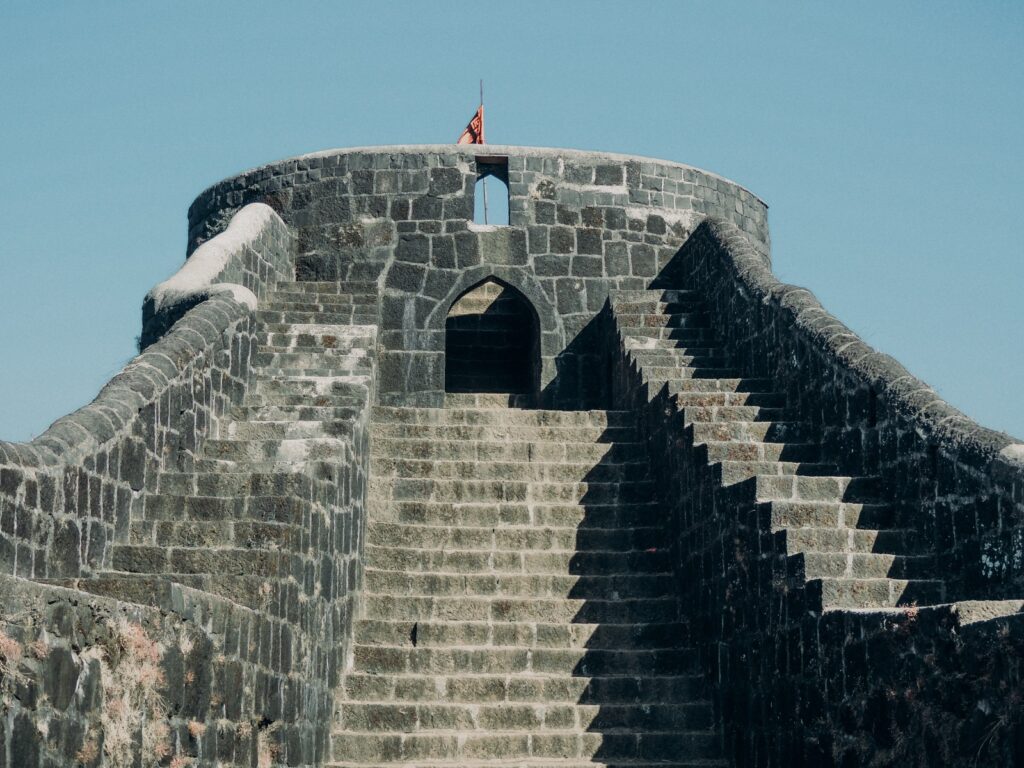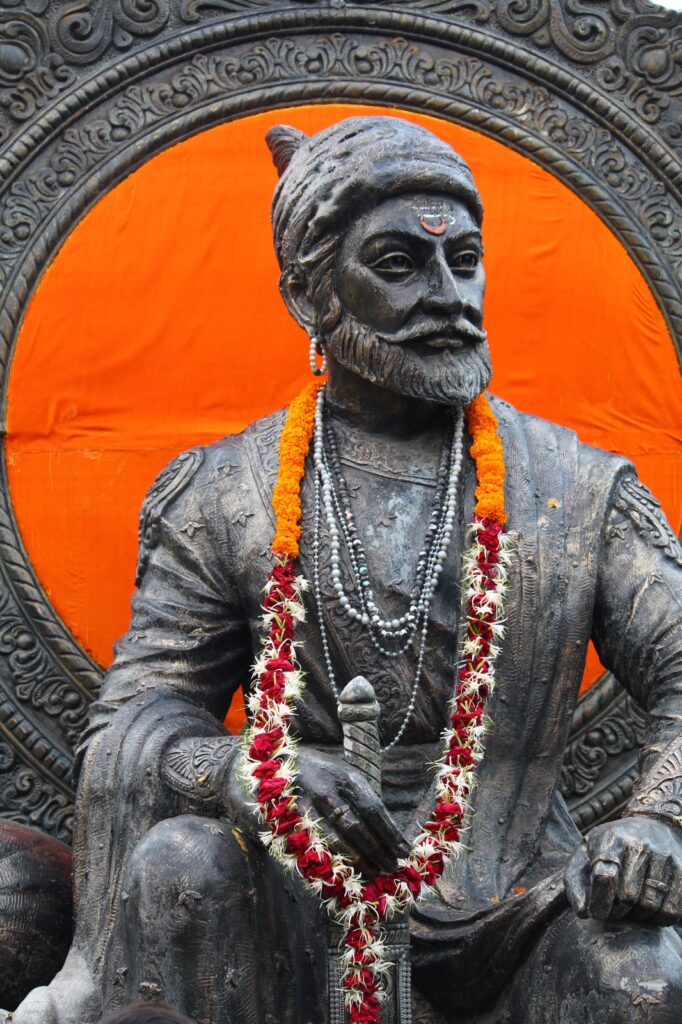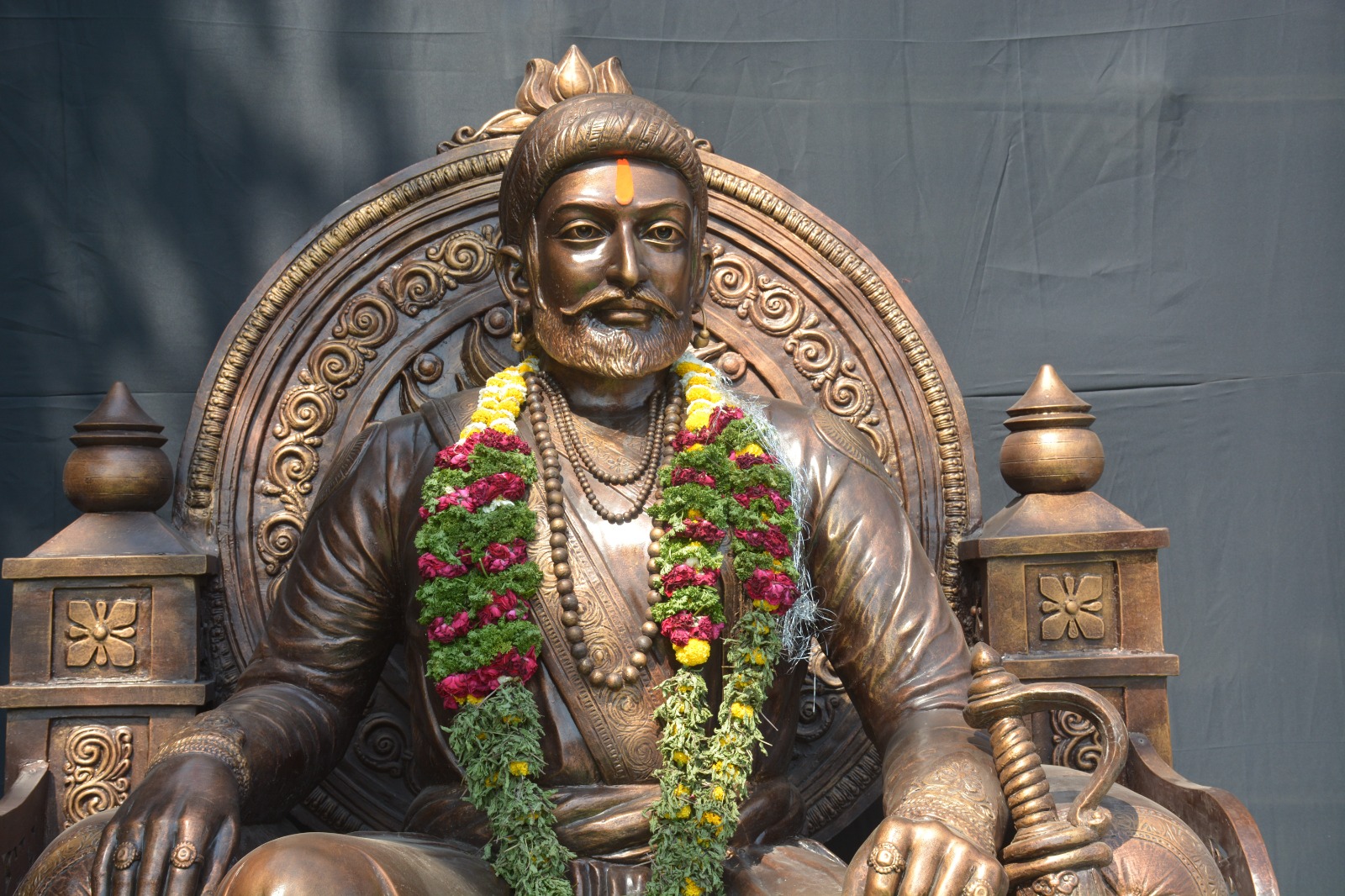Chatrapati Shivaji Maharaj, born on February 19, 1630, in the majestic Shivneri Fort, Maharashtra, was a visionary leader, military genius, and the founder of the Maratha Empire in India. His life story is a saga of valor, resilience, and nation-building, making him one of India’s most revered historical figures.
Chatrapati Shivaji Maharaj’s Birth and Early Life:
Chatrapati Shivaji Maharaj was born on February 19, 1630, in the heart of Maharashtra, within the formidable walls of Shivneri Fort. His parents, Shahaji Bhosale and Jijabai, were stalwarts of the Bhonsle Maratha clan. Shivaji’s birthplace, Shivneri Fort, would later become an enduring symbol of his legacy.
Shivaji’s early life was profoundly influenced by his mother, Jijabai. Her teachings imparted a strong sense of duty, righteousness, and an unwavering commitment to the welfare of his people. Under her guidance, Shivaji imbibed the values of justice, courage, and the importance of protecting his subjects from oppression.
Growing up in the tumultuous Deccan region, Shivaji had the privilege of witnessing the intricate dynamics of politics and warfare. His father, Shahaji, served several Deccan sultans, exposing Shivaji to the complexities of the political landscape. This early exposure would lay the foundation for his future as a military genius and visionary leader.
Foundation of the Maratha Empire by Chatrapati Shivaji Maharaj:
Shivaji’s journey towards building the Maratha Empire commenced at a remarkably young age. At just 16 years old, he embarked on a series of military campaigns that would ultimately lay the foundation for one of India’s most prominent historical empires.
Recognizing the oppressive rule of both the Mughal and Adilshahi Sultanates in the Deccan region, Shivaji saw an opportunity to free his people from tyranny. He initiated his military campaigns with the strategic capture of forts that held immense significance in the region. Among these, Torna and Rajgad forts were notable conquests, reflecting his tactical brilliance.
Shivaji’s early victories bolstered his reputation as a formidable warrior and leader. He continued to expand his territorial control, establishing a Maratha kingdom that would eventually evolve into a powerful empire. These early conquests not only demonstrated his military prowess but also showcased his commitment to Hindavi Swarajya, the idea of self-rule for the people of India.
The foundation of the Maratha Empire was marked by Shivaji’s unwavering determination to create a realm where his subjects could live in peace and prosperity. His military campaigns and strategic acquisitions were pivotal steps towards realizing this vision, and they remain a testament to his indomitable spirit and his enduring legacy as a visionary leader and nation-builder.
Raigad Coronation by Chatrapati Shivaji Maharaj: A Symbol of Hindavi Swarajya:
In the annals of Indian history, the coronation of Shivaji as “Chatrapati” at the Raigad Fort in 1674 stands as a momentous event that transformed him from a regional warrior into an emperor. This coronation wasn’t merely a symbol of personal achievement; it signified his unwavering commitment to the concept of Hindavi Swarajya, which translates to self-rule for the people of India.
At the age of 44, Shivaji ascended to the grand title of Chatrapati, meaning “paramount sovereign” or “emperor.” This move wasn’t driven by personal ambition but by a profound desire to establish a just and equitable rule that would benefit the masses. Shivaji’s vision of Hindavi Swarajya aimed to liberate the people from foreign dominance and usher in an era of self-governance.
The Raigad Coronation was a meticulously orchestrated ceremony that adhered to Hindu rituals and traditions. It included the ceremonial purification of Shivaji, followed by the placing of a gold-plated crown on his head. The grandeur of the event wasn’t about opulence but about symbolizing his dedication to Hindavi Swarajya and the well-being and prosperity of his subjects.
By assuming the title of Chatrapati, Shivaji conveyed a resounding message: he wasn’t merely a regional king but an emperor with a vision of a united India, free from foreign subjugation. His coronation at Raigad remains a testament to his commitment to the ideals of self-rule, justice, and the welfare of his people, making him one of India’s most revered historical figures.

Strategic Brilliance: Chatrapati Shivaji Maharaj’s Military Acumen:
Chatrapati Shivaji Maharaj’s military strategy is an enduring testament to his genius as a warrior and a leader. His multifaceted approach encompassed guerrilla warfare, naval supremacy, and fortification, allowing him to establish and protect his kingdom effectively.
Guerrilla Warfare: Shivaji was a master of guerrilla warfare, a tactic he employed to great effect against the oppressive Mughal and Adilshahi Sultanates. His guerrilla tactics involved hit-and-run raids, ambushes, and the use of local terrain to gain strategic advantages. This unconventional approach confounded his enemies and allowed him to disrupt their operations, despite being numerically inferior.
Naval Prowess: Shivaji recognized the importance of a strong navy in safeguarding his coastal domains. He built a formidable naval force, which not only protected his territory but also allowed him to launch successful naval campaigns against foreign powers. His fleet was instrumental in securing critical coastal forts and trade routes.
Fortification: Shivaji’s vision extended to fortifying his realm. He recognized the strategic value of key forts and invested in their enhancement and maintenance. These forts served as critical strongholds, thwarting foreign invasions and acting as centers of administration and governance.
Shivaji’s military prowess wasn’t just about conquest but also about effective defense and governance. His strategies ensured the security of his kingdom and the well-being of his people. His legacy in military strategy endures, inspiring military leaders and strategists worldwide.
Architect of Governance: Chatrapati Shivaji Maharaj’s Administrative Genius:
Chatrapati Shivaji Maharaj was not only a formidable warrior but also a visionary administrator. He recognized that effective governance was essential for the well-being of his subjects and the stability of his kingdom. His administrative reforms laid the foundation for a just and efficient administration.
Efficient Administrative System: Shivaji implemented a well-structured administrative system that encompassed various facets of governance. His system included efficient revenue collection mechanisms, ensuring that the state had the necessary resources for its functioning. This revenue collection was essential for the development of infrastructure and the well-being of the people.
Justice and Local Self-Governance: Shivaji’s administration prioritized justice. He ensured that his subjects had access to a fair legal system, which was essential for maintaining law and order. Additionally, he promoted local self-governance, allowing communities to manage their affairs and contribute to the overall governance of the kingdom.
The Ashtapradhan Council: One of the hallmarks of Shivaji’s administration was the “Ashtapradhan” council, which served as the backbone of his governance. Comprising eight ministers, each responsible for specific aspects of administration, this council helped streamline decision-making and ensure that various administrative functions ran smoothly.
Shivaji’s administrative reforms weren’t just about governance; they were about creating a just and efficient system that worked for the benefit of his people. His approach to administration continues to inspire leaders and administrators, emphasizing the importance of justice, efficient resource management, and local participation in governance.
Chatrapati Shivaji Maharaj’s Legacy of Religious Tolerance:
Chatrapati Shivaji Maharaj’s reign is not only celebrated for his military prowess and administrative acumen but also for his remarkable commitment to religious tolerance. In an era marked by religious strife and intolerance, Shivaji stood as a beacon of inclusivity and respect for all faiths.
Respect for All Faiths: Shivaji was renowned for his respect towards people of diverse religious backgrounds. He recognized the rich tapestry of cultures and religions in his kingdom and ensured that they coexisted harmoniously. His commitment to religious harmony was rooted in his understanding of the pluralistic fabric of India.
The Treaty of Purandar: One of the most significant expressions of Shivaji’s religious tolerance was the “Treaty of Purandar” with the Mughals. This treaty, signed in 1665, not only marked a diplomatic victory but also safeguarded the religious freedom of Hindus. It ensured that the Marathas could continue their religious practices without fear of persecution or discrimination.
Legacy of Inclusivity: Shivaji’s legacy of religious tolerance endures as a testament to the principles of unity in diversity. His approach to governance, which respected all faiths and allowed people to practice their religion freely, set a powerful example for future generations. It highlights the importance of coexistence and understanding among communities, contributing to the pluralistic ethos of modern India.
In a world often divided along religious lines, Shivaji’s unwavering commitment to religious tolerance serves as a timeless reminder of the values that should guide society towards harmony, unity, and mutual respect.

Chatrapati Shivaji Maharaj’s Enduring Legacy:
Chatrapati Shivaji Maharaj‘s legacy is deeply ingrained in the annals of Indian history. His life and reign left an indelible mark, and his legacy continues to inspire generations for several reasons.
Ideals of Hindavi Swarajya: Shivaji’s unwavering commitment to the concept of Hindavi Swarajya, or self-rule for the people of India, stands as a cornerstone of his legacy. His vision of a united and self-reliant India, free from foreign oppression, continues to resonate with the ideals of independence and sovereignty.
Military Strategy: Shivaji’s military genius and innovative tactics in warfare remain a subject of study and admiration. His mastery of guerrilla warfare, naval prowess, and the strategic fortification of key locations have inspired military leaders worldwide.
Administrative Acumen: The administrative reforms implemented by Shivaji, such as efficient revenue collection, a just legal system, and local self-governance, serve as a model for good governance. His “Ashtapradhan” council, consisting of eight ministers overseeing various aspects of administration, remains a testament to his administrative prowess.
Inspiration for Leaders: Shivaji’s life and leadership qualities continue to inspire leaders and patriots. His courage, resilience, and dedication to the welfare of his people serve as a guiding light for those striving for a just and prosperous society.
A Unifying Figure: Shivaji’s legacy transcends regional and cultural boundaries, uniting people from diverse backgrounds in admiration of his contributions. His commitment to religious tolerance and coexistence embodies the spirit of unity in diversity.
A Visionary Leader: Shivaji was more than just a warrior king; he was a visionary who dreamed of a unified India free from foreign oppression. His concept of Hindavi Swarajya, or self-rule for the people of India, demonstrated his commitment to the welfare of his subjects and the idea of a united nation.
Courage and Valor: Shivaji’s life is a testament to unwavering courage and indomitable spirit. His daring military campaigns, including guerrilla warfare and naval expeditions, showcased his fearlessness in the face of adversity.
Inspiration for All: Shivaji’s legacy serves as a perennial source of inspiration. His life story, marked by resilience, justice, and unwavering determination, continues to motivate leaders, patriots, and individuals striving for a just and prosperous society.
Chatrapati Shivaji Maharaj was a unifying figure who laid the foundation for a unified India. His legacy of courage, justice, and administrative acumen remains a guiding light, inspiring individuals and leaders to uphold these noble ideals and work towards a better, more just world.



